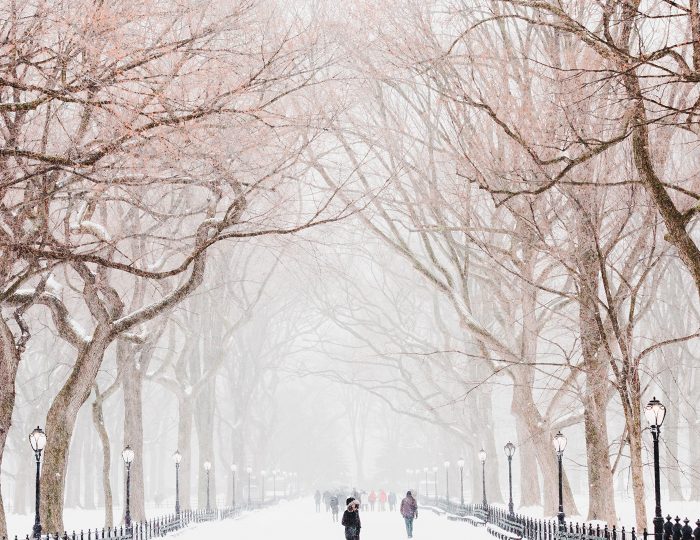Winter wonderland, or a nightmare before Christmas? Those seemed to be the two main reactions when the majority of the British public woke up to a thick blanket of snow on Sunday morning.
Typical scenes have played across the news this week: despondent drivers shovelling around their cars, broken down buses, and power outages.
As inconvenient as the snowfall might be, there’s something undeniably breath-taking about that first moment, gazing out at a pure white blanket which has transformed the familiar into something beautiful.
For me, it always brings to mind a favourite carol, ‘In the Bleak Midwinter’. Written by Christina Rossetti, it was originally a poem published in a magazine in 1872. I love it because it’s full of the very contrasts and reversals which make Jesus so surprising.
‘Our God, Heaven cannot hold Him’, yet here a ramshackle ‘stable place sufficed’. A mighty King ‘whom cherubim, worship night and day’ is provided with just a ‘breastful of milk, and a mangerful of hay’. Jesus is so holy and so worthy that ‘angels fall before’ him, yet in this humble nativity scene it’s ‘the ox and ass and camel which adore’.
These words capture a beautiful glimpse of Jesus as he’s described in Philippians 2:6–7:
‘Who, being in very nature God,
did not consider equality with God something to be used to his own advantage;
rather, he made himself nothing
by taking the very nature of a servant,
being made in human likeness.’
Rossetti’s frosty setting is just a poetic device, and Jesus probably wasn’t born in the winter. But still, I think there’s something rather powerful about the image of Christ’s birth at the very darkest moment of the year, with the earth hardened and water frozen. Here is a baby who offers to bring new light and life, even in the midst of the bleak midwinter.
By the end of the day, the snow has turned into a grey and ugly sludge, trampled underfoot. It’s a poignant reminder of the mess we humans leave behind. How wonderful, then, that God does quite the opposite when he chooses to transform our blackened, trampled slush into a dazzlingly pure white. So even when the trains are delayed and the motorways grind to a halt, may we whisper with the awe of the psalmist:
‘Purify me from my sins, and I will be clean;
wash me, and I will be whiter than snow.’
Katherine Ladd
Katherine is in her final year studying English at Cambridge University. See her her blogs here.


Thank you for this reflection, beautifully put. The contrast of Christ in a manager compared with the glory and splendour of heaven – awesome.
Isn’t it just a wonderful truth to proclaim
Refreshingly simple to read and yet profound enough to impact upon the intelligent mind. Well done Katherine.
Thought provoking and too often we miss the beauty because of ‘the grey and ugly sludge’ we make of God’s creation. May we see and wonder a little bit more.
A lovely piece – especially like the idea of the magical whiteness of snow as a sign of God’s grace… it’s interesting, I think a big part of the power of The Lion the Witch & the Wardrobe is actually the attractiveness of the snow, even if it is there meant to symbolise a reign of evil… although to be fair it’s still always nice to see spring too!
Katherine,
What a lovely balanced piece, bot not losing sight of the essential.
Also on the snow theme, with the ‘Mountain’ documentary film on general release today, I recently wrote a post on the power of mountains to stir our spirits… A snow extract:
‘Snow-boarder tracing angular poses in dazzling snapshots of mid-air magic. A trio of paraglide skiers skimming snow-clad outcrops with balletic grace, canopies billowing behind, while another flees swift snapping avalanche – in turn pursuing a hit of adrenalin and fear. Maestros of the mountains all…’
I love this carol too – thank you for affirming it so beautifully.
Beautiful, glorious, uplifting, thank you!
Great article about one of my favourite carols. Christina Rossetti was a High Church Anglican and the poem combines the symbolic imagery of the incarnation with a simple faith:
‘Yet what I can I give him-give him my heart’.
She was also a social reformer and worked in one of the worst women’s prisons in London.
Beautiful – thank you!
Really beautiful – thank you
It lifts my heart and soul above the clamour of the Christmas business to the glory of a world washed clean. Thank you.
My favourite carol. Very well put.
I just referenced this post in my own blog – about how seeing Narnia (with all its snowy imaginative resonances) on stage recently reminded me of the irresistibly beckoning quality of the gospel – not to religion, rules or moral and mental straitjackets, but to glorious, liberating relationship and adventure… feel free to read 🙂